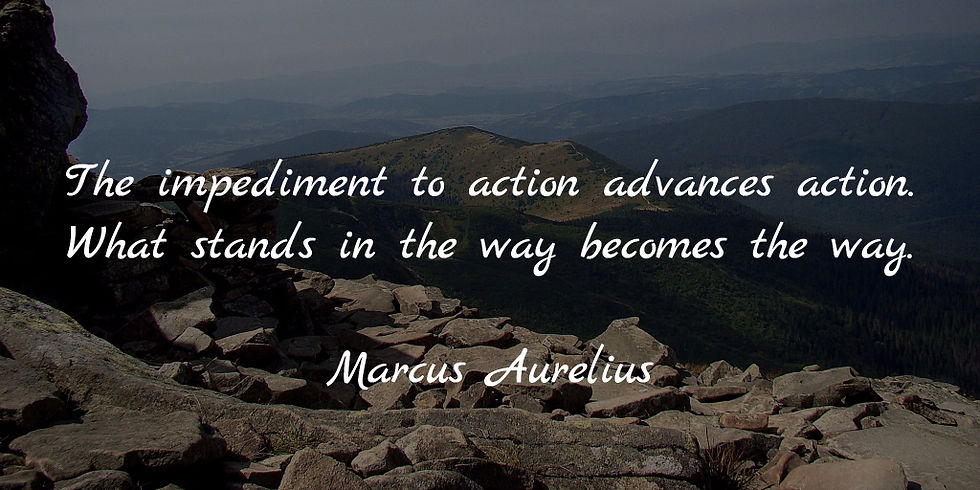The Complain, Defer, Then Give Up Trap
- Trish Cody
- Dec 22, 2016
- 4 min read

I want you to read the above quote from Marcus Aurelius a few times, especially if you have never been exposed to the great Roman emperor’s writings. Why do I want you to read it more than once? Because the ideas behind this quote (and Aurelius’s entire philosophy) is so against the standard way of thinking that it sometimes takes a bit of repetition to absorb.
What he’s talking about is obstacles, which we’re all very familiar with. Obstacles can be very physical (there’s a huge boulder blocking the road and I can’t get to my destination), or they can be more in our heads (smarter people than me are applying for this job) or anywhere in between. The truth of the matter is, life is full of obstacles. For everyone. No matter how rich or pretty or smart or thin or accomplished we are, we can still be hit full in the face with obstacles on any day at any time.
It’s how we deal with these obstacles that define who we are. Now that isn’t the mind-blowing concept that we’re going to be talking about in these next few posts. How we deal with problems and how that defines us is a pretty normal idea and one that most of us accept as true. What we’re talking about is another concept altogether: we should not be seeing obstacles as problems we must solve. We must start seeing obstacles as our key to great success.
What am I talking about here and where did I get it from? One of my favorite books is by Ryan Holiday and it’s called The Obstacle is the Way. Largely built on the philosophy of Marcus Aurelius, Holiday’s book is not about seeing the light at the end of the tunnel. Rather, it’s about taking that dark tunnel that everyone else is trying to get through as fast as possible and using it in a way that sets us apart from others and gives us an advantage.
Huh? You might say. How can I see losing a job, getting divorced, being blind in one eye etc. etc. etc. as having an advantage? Isn’t that just something I need to deal with as best as possible and move on?
The short answer is: no.
The longer answer is: that’s what everyone else is doing, so if you can see the advantage in the obstacle, you’ll be able to excel where others have failed. Too many times, we fall into the trap of thinking that something is ‘bad’ simply because we’re programmed to think that way. The truth is, no situation is ‘good’ or ‘bad’ until we assign that description to it. And guess what? We have the power to assign any description we want!
When we assign something a ‘bad’ title, we immediately see it as an obstacle and then we tend to shut down. “Oh, I was going to quit my job and open my own business but now the economy has tanked and I can’t.” Or, “This presentation was going to be awesome, but then my co-worker got sick and didn’t finish her part, so now it’s incomplete and going to suck.”
You see the pattern here? It’s a trap. When we assign the ‘bad’ label (the economy taking a downturn, our co-worker getting sick), our first course of action is usually to complain.

Why did this happen to me?
Why did she get sick in the middle of this project?
Our next course of ‘action’ is to defer.

I’d better wait to start my business until the outlook is a little more favorable.
I’ll just tell the boss what happened and ask if we can finish it when she’s feeling better.
Inevitably, when things continue to not go our way (as things tend to do), we give up.

What would this look like if we didn’t fall into the trap? What if we saw the economic downturn as an opportunity to jump into a field that no one was capitalizing on because they were too afraid? What if we saw our co-worker’s sickness as the chance we’d been waiting for to take the whole project onto our shoulders and show the boss what we’re made of? How would that change things?
In my next few posts, we’ll look deeper into seeing obstacles as opportunities and how to take action when everyone else is stuck in a trap of their own making. I look forward to sharing these ideas with you!
Trish Cody has over 18 years of experience consulting with some of the world’s top Fortune 500 Companies. Today, as an ICF and iPEC Certified Coach and Energy Leadership Master Practitioner, Trish works with clients to uncover their core values and beliefs, clearly see how they are showing up in their behaviors and impacting their success, and to shift their thinking to naturally attract positivity and success. For more information, visit www.TrishCody.com.















































Comments